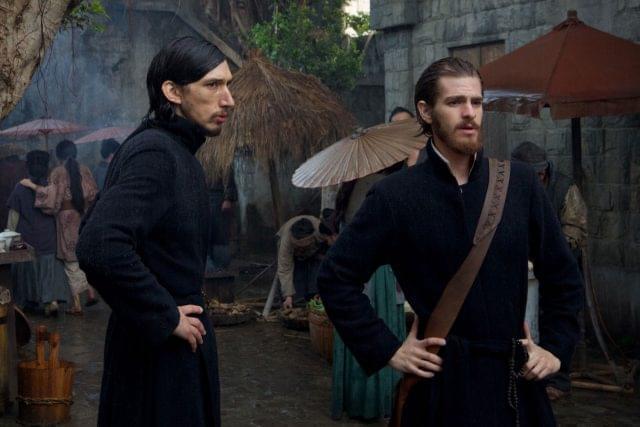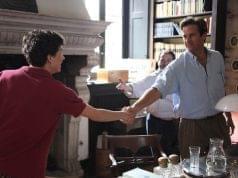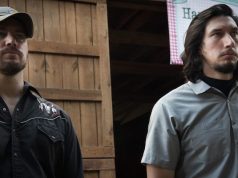
Martin Scorsese works with two of his favorite themes in “Silence” — Catholicism and violence — but not in the way he’s done in the past. Slowly paced and, yes, often quiet, Scorsese’s adaptation of Shusaku Endo’s acclaimed 1966 novel has the contemplative mood of a Terrence Malick film, or one of Werner Herzog’s madmen-in-jungles adventures, not his usual operatic frenzy of blood and mania.
The change in style fits the reverence of the story, which is set in Japan in the 1600s (there’s plenty of Kurosawa here, too) and concerns Christians trying to spread their gospel to a country whose leaders violently oppose it. Two Jesuit priests, Father Rodrigues (Andrew Garfield) and Father Garupe (Adam Driver), hear that their mentor, Father Ferreira (Liam Neeson), a missionary in Japan, has renounced the faith and converted to Buddhism. They can’t believe it, but the only way to know for sure is to go to Japan and find him. (Is this an “Apocalypse Now,” too? A little bit, but don’t get your hopes up.)
Trouble is, once they’re in Japan, Rodrigues and Garupe can’t do much searching because they have to hide. Christianity is illegal here, and the Inquisitor, Inoue (Issei Ogata), uses an imaginative variety of torture techniques to make believers either deny the faith or die. The priests find a cluster of devout Japanese converts who have been observing their religion in secret, who have been praying for the Church to send someone to minister to them.
The faith displayed by these Japanese Catholics is humbling in its purity but troubling in its implications. They seem to be more invested in sacred icons like crosses and rosaries than in doctrine, and there are legitimate questions about how much they really understand — how converted they really are — given the language and cultural barriers. Rodrigues and Garupe debate what to do next, how to tend to this flock and other underground congregations while pursuing their original mission to find Ferreira (if he’s even still alive).
They disagree, too, on the right course of action for a believer being asked to choose between his faith and his life. The Inquisitor’s simple test is to have suspected Christians step on a small engraving of Jesus to indicate their apathy toward Him. Rodrigues suggests that if the alternative is to be tortured to death, it’s OK to do this one blasphemous but ultimately meaningless thing; after all, God knows your true heart. Garupe, more rigorous about these things, is appalled at the suggestion.
Questions like that are at the heart of the film. Rodrigues struggles with hiding while followers are being killed, struggles with the resounding silence he seems to get from the heavens. A tragic clown named Kichijiro (Yosuke Kubozuka), a lapsed Japanese convert, is the film’s avatar of weakness, forever denying the faith when his well-being is threatened, then begging forgiveness. Is that OK? Where’s the line between “faithful but pretending not to be for safety’s sake” and “not actually faithful”? When you get right down to it, isn’t all faith internal? Do external gestures even matter?
Rodrigues’ character arc is complex, full of contradictions and self-recriminations. I wish Garfield’s performance had the depth to match. He’s completely immersed in the role, but you get the impression that Garfield himself didn’t fully grasp its intricacies. (Driver is better, but Garupe fades into the story’s periphery, and I find that character less interesting anyway.)
When Rodrigues discusses religion with the Inquisitor (an old, slightly comical dandy), whose point is that Christianity is fundamentally at odds with Japanese philosophy and simply cannot grow here, Rodrigues is condescendingly oblivious. Well, of course it can grow here. It’s the True Gospel! Even if you agree with him on that, it’s fair to ask a question that he doesn’t: Should the Church even be trying to make inroads in a country that emphatically doesn’t want them?
Scorsese, who co-wrote the screenplay with frequent collaborator Jay Cocks, is right at home exploring these complicated questions, undaunted (maybe emboldened) by the fact that they don’t have easy answers. He luxuriates in the misty beauty of Japan (actually Taiwan) and fills the soundtrack with crickets, breezes, and other ambient sound, giving us space to ruminate. This may be patience-trying for viewers who aren’t personally interested in matters of faith and spirituality, though the steady, ominous threat of violence provides its own sort of tension. But for someone who enjoys pondering such things, it’s an effective provocation to further thought.
B (2 hrs., 41 min.; )





